-
 Art of Wellness Acupuncture & Traditional Chinese Medicine (TCM)11704 Wilshire Blvd, Suite 295, Los Angeles, CA, 90025
Art of Wellness Acupuncture & Traditional Chinese Medicine (TCM)11704 Wilshire Blvd, Suite 295, Los Angeles, CA, 90025
myartofwellness@gmail.com310-451-5522 Office Hours
MonClosedTue7:30 am --4 pmWed7:30 am --4 pmThu7:30 am -- 4 pmFri7:30 am -- 4 pmSat7:30 am -- 4 pmSunClosedOur office opens from Tuesdays to Saturdays 7:30 am to 4 pm, will be closed on Memorial day, Independent day, Labor day, Thanksgiving day, Christmas and New year.
-
Recent Posts
- Acupuncture for Sciatica Pain
- Can Acupuncture Help With Bladder Control?
- How to Treat De Quervain’s Tenosynovitis With Acupuncture and TCM
- Chinese New Year 2026: Year of the Horse
- Acupuncture and TCM Treatment for Perimenopause Symptoms
- How to Treat Insulin Resistance With Acupuncture and TCM
- How to Treat Metabolic Syndrome With Acupuncture and TCM
- How to Treat Syncope With Acupuncture and TCM
- How to Treat Thoracic Outlet Syndrome With Acupuncture and TCM
- How to Treat Dupuytren’s Contracture With Acupuncture and TCM
- How to Treat Nutcracker Syndrome With Acupuncture and TCM
- How to Treat Rosacea With Acupuncture and TCM
- How to Treat Perioral Dermatitis With Acupuncture and TCM
- Lymphatic Drainage With Acupuncture and TCM
- How to Treat Turf Toe With Acupuncture
- How to Treat Nerve Pain With Acupuncture and TCM
- Sign up to receive news and updates and get my free report:“The Top 10 Reasons to Try Acupuncture”

February 2026 M T W T F S S 1 2 3 4 5 6 7 8 9 10 11 12 13 14 15 16 17 18 19 20 21 22 23 24 25 26 27 28
Herbal Medicine
How to Treat Chronic Fatigue Syndrome With Acupuncture and TCM
By Xiaomei Cai, L.Ac., Ph.D. & Qineng Tan, L.Ac., Ph.D.
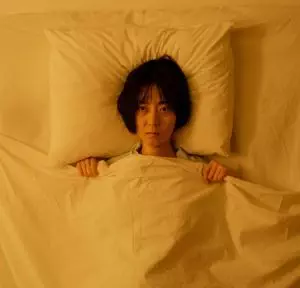
Chronic fatigue syndrome (CFS), also known as myalgic encephalitis (ME/CFS), is a condition marked by extreme fatigue that doesn’t get better, even with rest, and gets worse with physical and mental exertion. Chronic fatigue is not well understood by medical science, but acupuncture and Chinese medicine for chronic fatigue syndrome symptoms can be an effective treatment option.
People with chronic fatigue syndrome are always tired, even after getting a normal amount of sleep, and the condition persists for weeks, months, or years. Other chronic fatigue symptoms include body aches, cognitive problems, vision problems, and emotional or mental health problems, like depression and anxiety.
If a person feels tired all the time, with no medical explanation, for six months or more, and has several other chronic fatigue syndrome symptoms like dizziness, difficulty concentrating, headaches, or sensitivity to light, then they might be diagnosed with CFS, or myalgic encephalitis (ME CFS).
By definition, a syndrome is a collection of symptoms that often appear together in combination, for which the exact explanation is unknown. Chronic fatigue has been considered a syndrome for some time, but has more recently been given the designation of a “disease;” hence, the newer term “myalgic encephalitis,” which refers to muscle pain and inflammation of the brain and spinal cord.
Chronic fatigue syndrome symptoms can be very similar to those of fibromyalgia. People with fibromyalgia also experience severe fatigue, but the primary symptoms of fibromyalgia are musculoskeletal pain that comes and goes all over, especially in “tender points” around the major muscles and joints, along with swelling and inflammation. It is possible to have both ME/CFS and fibromyalgia.
Women are much more likely to have chronic fatigue than men. MECFS can begin to appear at any stage of life, but most usually develops in adulthood. It is estimated that up to 90% of people who have chronic fatigue go undiagnosed.
ME/CFS is a serious and disabling condition that can interfere with even the most basic daily activities. People with chronic fatigue may be able to participate in some events where they exert themselves mentally and/or physically, but afterwards, they will feel completely wiped out and have to take time to recover, often confined to bed. This is called post-exertional malaise (PEM).
Top 10 Chronic Fatigue Syndrome Symptoms
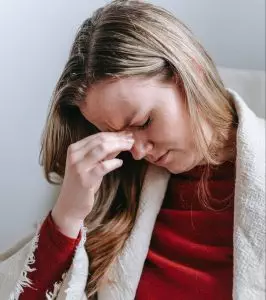
The most common ME/CFS symptoms include:
- Fatigue, tired all the time, weakness
- Sensitivity to light
- Trouble concentrating, hard to focus, memory problems, confusion
- Dizziness, especially when getting up from lying down
- Headaches
- Muscle aches, body ache, muscle weakness, joint pain
- Enlarged lymph nodes in neck or armpit area, sore throat
- Tired after exercise or mental exertion (post-exertional malaise)
- Depression, mood swings, moodiness
- Insomnia, sleep problems
Other signs of chronic fatigue syndrome may include: fever, abdominal pain, weight loss or weight gain, allergies, rash, rapid heart beat, and night sweats/hot flashes.
What Causes Chronic Fatigue?
The cause of ME/CFS is not known. Immune system dysfunction, the aftereffects of having a virus, and psychological factors have all been associated with the development of chronic fatigue.
Some people begin to have symptoms of chronic fatigue after having a viral infection, such as Epstein Barr, mononucleosis, or herpes. Postural orthostatic tachycardia syndrome (POTS) is also strongly associated with chronic fatigue.
While it does seem that some people who suffer from CFS also have immune system problems, chronic fatigue is not considered to be an autoimmune disorder in and of itself. As with other conditions like lupus or fibromyalgia, CFS sometimes appears after a person has gone through some sort of emotional trauma or physical injury.
Some people with chronic fatigue have hormone imbalances related to pituitary hormone, adrenal hormone, or hypothalamus hormones, but it is not understood how these might be related to their condition. Diabetes, anemia, or hypothyroidism can also create hormonal imbalances that can contribute to chronic fatigue.
In some cases, chronic fatigue could be due to a sleep disorder, such as sleep apnea or chronic insomnia. Long-standing mental health issues like depression, anxiety, or PTSD can interfere with sleep and hormone responses, contributing to the chronic fatigue syndrome symptoms.
Treatment for Chronic Fatigue Syndrome Symptoms

There is no clear treatment protocol within conventional Western medicine for ME/CFS. A doctor may diagnose myalgic encephalitis if they have ruled out other possibilities and then try to recommend medications or various types of therapy to help people deal with the symptoms of chronic fatigue.
Pain relievers or NSAIDs will often be the standard recommendation for handling ME/CFS related pain like headaches or muscles aches.
Doctors may prescribe antidepressants as a way of helping patients cope with depression and anxiety related to chronic fatigue. However, these medications can sometimes cause side effects that will exacerbate the chronic fatigue rather than helping it.
Some doctors have tried treating CFS with antiviral medications, corticosteroids, or thyroid hormone medications. None of the pharmacological interventions that have been used to treat chronic fatigue syndrome have proved to be very effective.
Thus, many patients with ME/CFS consider turning to alternative medicine or complementary therapies to relieve CFS symptoms. Acupuncture is now widely recognized as an alternative therapy for chronic fatigue.
Can Acupuncture and Chinese Medicine Help Chronic Fatigue Syndrome?
Traditional Chinese medicine is well suited to treatment for ME/CFS. Overall, TCM philosophy pays close attention to the subtle balance of energy, known as Qi, within the body as a whole, as well as within the various organ systems. By observing the specific symptoms each person experiences as part of chronic fatigue syndrome, we can pinpoint which organ systems are deficient and need strengthening.
Classic TCM patterns related to chronic fatigue diagnosis include:
- Spleen Qi deficiency
- Liver Qi stagnation
- Kidney deficiency
- Yin deficiency
- Heat toxicity
- Phlegm obstruction/dampness
Latent heat and dampness are sometimes the long-term effects of a viral infection or other illness, or a long period of emotional stress. These conditions originate from an external pathogenic factor, but then cause a series of imbalances which weaken the kidneys and other organs over time. Acupuncture treatment and herbs can help reduce inflammation and strengthen Qi.
A TCM doctor will choose acupuncture points and a combination of herbs that will help harmonize the affected systems. With herbs, we are able to get nutrients into the body beyond what you can do with foods alone. A balanced diet that cools heat and tonifies the organs will also be important for recovering strength and energy.
One controlled trial found that four weeks of acupuncture treatment led to improvements in CFS symptoms.
A systematic review of studies regarding acupuncture treatment for ME CFS showed a reduction in the severity of fatigue.
A study using acupuncture and moxibustion treatment for CFS showed a 90% effective rate, with half of the patients feeling that their CFS was “cured.”
Another study involving acupuncture and moxibustion found that the moxa treatment in particular became more and more effective as treatment sessions continued past the 10th treatment. Moxibustion was shown to have an effect on the vagus nerve, which controls the parasympathetic nervous system.
How long it takes to get results from acupuncture treatment for chronic fatigue will vary from person to person, depending on how long the person has been experiencing CFS, and how deeply the organ systems are affected. TCM treatment has a cumulative effect which strengthens over time and several sessions.
Acupuncture Near Me for Chronic Fatigue Syndrome (ME/CFS) in the Los Angeles Area
ME CFS is far more common than statistics show, because many people suffer in silence and invisibility. Now, many people are struggling with chronic fatigue after having COVID-19. TCM modalities like acupuncture, Chinese herbs, and moxibustion, can help relieve fatigue, depression, mental fogginess, poor sleep, and other symptoms of CFS. If you or someone you love has been feeling exhausted for months without improvement, it may be time to consider trying acupuncture for chronic fatigue.
*This article is for education from the perspective of Traditional Chinese Medicine only. The education provided by this article is not approved by FDA to diagnose, prevent, treat and cure human diseases. It should not stop you from consulting with your physician for your medical conditions. Traditional Chinese Medicine is based on Qi, which is an invisible force that usually cannot be observed by modern science. Because science focuses on testing ideas about the natural world with evidence obtained through observation, these aspects of acupuncture can’t be studied by science. Therefore acupuncture and Chinese herbs are often not supported by double-blind, randomized trials, and they are considered alternative medicine therapies in the United States.
How to Treat Emphysema With Acupuncture and TCM
By Qineng Tan, L.Ac., Ph.D. & Xiaomei Cai, L.Ac., Ph.D.

Pulmonary emphysema is a kind of chronic obstructive pulmonary disease (COPD) that causes coughing and wheezing. Symptoms of emphysema are similar to those of chronic bronchitis and pneumonia. Acupuncture treatment and TCM herbs can help relieve emphysema symptoms and other COPD symptoms.
COPD refers to a group of progressive lung diseases, where damage to the lungs causes serious breathing problems and a chronic cough. Emphysema and chronic bronchitis are both considered COPDs, and it is possible to have both of these conditions at the same time.
Bronchitis is when there is inflammation in the bronchial tubes that bring airflow into the lungs, so they get swollen and have too much mucus buildup. Emphysema is what happens when there is damage to the alveoli, the small air sacs that make up the bottom part of the lungs. This makes it difficult to draw a full breath and get enough oxygen into your bloodstream.
Smoking is the primary thing that causes emphysema. Exposure to toxic chemicals or air pollution, repeated respiratory infections, or a genetic predisposition could also be causes of emphysema.
The number one thing people can do to prevent or help emphysema is to quit smoking. Acupuncture treatment can help people overcome nicotine addiction.
Acupuncture and other TCM treatment can also help to clear the lungs, reduce inflammation and shortness of breath, and improve quality of life for people suffering from emphysema and other types of COPD.
Top 10 Symptoms of Emphysema

In many cases, people do not realize that they have emphysema; they may only be feeling some fatigue and shortness of breath and not take much notice. By the time symptoms have become severe enough that they seek medical help, they may have already suffered a lot of lung damage.
Emphysema symptoms are similar to those of bronchitis; although, with acute bronchitis, there may also be chills and fever, and a sense of tightness in the chest.
The most common symptoms of emphysema include:
- Chronic cough, coughing up phlegm, cough with mucus, smoker’s cough, persistent cough
- Shortness of breath, especially with activity or exercise (dyspnea)
- Rapid breathing, breathing fast
- Wheezing
- Sputum, mucus, mucous, phlegm
- Fatigue, chronic fatigue
- Sleep problems, trouble sleeping, insomnia
- Heart problems
- Depression, anxiety
- Weight loss
Other signs of emphysema or COPD include: blue fingernails or lips, enlarged glands, broken capillaries under the skin, enlarged veins around the neck, enlargement of the chest or rib cage (emphysema barrel chest), and repeated respiratory infections.
4 Stages of COPD
As a COPD, emphysema is a progressive lung disease. Sometimes symptoms worsen and breathing becomes more difficult over a short period of time; this is known as an “emphysema exacerbation.” As a person’s respiratory function decreases, they are said to enter the later stages of COPD. Interventions and treatments may help to slow COPD progression.
Emphysema can greatly increase the risk of a person having heart problems, due to extra pressure on the blood vessels around the heart. It can also eventually lead to there being actual holes in the lung tissues, or a collapsed lung (pneumothorax).
Medical Treatment for Emphysema

In order to diagnose emphysema, doctors may look at X-ray or CT scans imaging to see damage to the lungs. Blood tests and other lung function tests like spirometry may show the level of oxygen in your bloodstream.
Medical science has no cure for the lung damage caused by emphysema. Bronchodilators or inhaled corticosteroids may be prescribed, which can help open airways and reduce shortness of breath. Antibiotics may be used to keep infections like the flu or pneumonia at bay. If emphysema gets to a severe stage, some people may need supplemental oxygen. Some patients may be able to have a major surgery, such as lung volume reduction (removal of damaged lung tissue) or a lung transplant.
TCM modalities like acupuncture and herbal medicine can help relieve shortness of breath and coughing, improving quality of life, while staving off further decline in lung function. Acupuncture, herbs, and moxibustion can be used effectively as adjuncts to regular medical treatments for emphysema.
Can Acupuncture Help Emphysema?
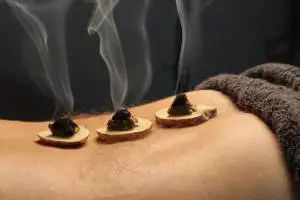
According to TCM theory, emphysema is considered to be caused by Lung deficiency, which can lead to “fei zhang,” distension of the lungs, and/or “chuan zheng,” which means “panting.” TCM can help COPD in several ways: by clearing lung congestion and opening the bronchial airways, helping to boost immune function so that a person can better avoid infections, and providing more nutrient-rich blood flow to the whole body.
One study found that COPD patients who were given acupuncture treatment had improved breathing when doing a six minute walk.
A systematic review comparing TCM treatment and convention treatment for COPD showed that acupuncture, acupressure massage, and moxibustion were all effective interventions and concluded that TCM works well as a complementary medicine/adjunct therapy for COPD.
Many Chinese herbs and herbal formulations are useful for helping to dissolve phlegm and reduce inflammation of lung tissues. TCM herbal preparations can help reduce phlegm and clear heat, relieve inflammation of airways and improve lung function.
Nutrition is also very important for patients with emphysema, who may suffer weight loss due to lack of proper nutrients in the bloodstream. An acupuncture practitioner will work with each individual to determine what kind of food program will help to reduce inflammation and provide adequate nourishment for the organ systems.
Acupuncture Near Me for Emphysema COPD in Los Angeles
TCM is a good way to help people breathe easier, whether they are suffering from allergies, asthma, pneumonia, Cystic Fibrosis, the common cold or a sore throat, or COPDs like bronchitis and emphysema. If you or someone one you love needs to quit smoking, or has been exposed to chemical pollution through their work, acupuncture can help to detoxify and strengthen the lungs.
*This article is for education from the perspective of Traditional Chinese Medicine only. The education provided by this article is not approved by FDA to diagnose, prevent, treat and cure human diseases. It should not stop you from consulting with your physician for your medical conditions. Traditional Chinese Medicine is based on Qi, which is an invisible force that usually cannot be observed by modern science. Because science focuses on testing ideas about the natural world with evidence obtained through observation, these aspects of acupuncture can’t be studied by science. Therefore acupuncture and Chinese herbs are often not supported by double-blind, randomized trials, and they are considered alternative medicine therapies in the United States.
How to Treat Huntington’s Disease With Acupuncture and TCM
By Qineng Tan, L.Ac., Ph.D. and Xiaomei Cai, L.Ac., Ph.D.
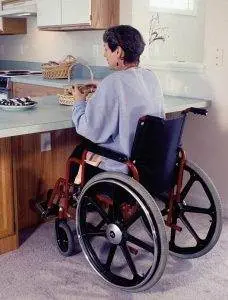
Huntington’s disease is a rare genetic disorder that causes progressive neurodegenerative disease. A neurological disorder, Huntington’s causes damage to brain cells, which leads to physical symptoms like tremor, cognitive problems, and mental disorders, including feelings of depression.
Signs of Huntington’s disease (HD) can begin to show up at any time after age two, and in some cases, a child may develop juvenile Huntington’s disease. Most often, though, a person does not begin to have symptoms of Huntington’s disease until adulthood, usually when they are in their 30s or 40s. Huntington’s is a progressive disease in which symptoms become increasingly severe over time.
Medical science does not currently have a cure for Huntington’s, nor a treatment that will halt the progression of Huntington’s disease. Patients may receive treatment in the form of medications and physical therapy to help control physical symptoms like shaking hands and involuntary movements. They may also be prescribed psychiatric medications to try to help with depression and anxiety.
Acupuncture and TCM can be an effective adjunct and alternative treatment for Huntington’s disease, helping to protect and stimulate the nervous system. TCM can also help address mental health and emotional disorders, like depression, anxiety, and mood swings.
Huntington’s Disease Symptoms
People with Huntington’s disease may start off having a variety of mild symptoms. Over time, the symptoms may change, with some coming or going, and some getting worse. Signs of Huntington’s disease can be related to involuntary movements of the body, cognitive decline that affects a person’s thinking processes, and psychiatric disorders that cause emotional upset. Some of the most common symptoms of Huntington’s disease include:
- Uncontrollable movements: involuntary jerking of the limbs, or writhing, also known as chorea
- Stiff limbs, muscle stiffness, neck stiffness
- Tremor, shaky hands, difficulty holding things
- Slow or unusual eye movements
- Problems with balance or walking
- Difficulty swallowing
- Speech problems, slurred speech
- Having a hard time focusing on a a task
- Having a hard time finding the right words or processing information
- Getting completely caught up with a task or thought pattern
- Impulsive behavior or emotional outbursts
- Lack of awareness of how one is behaving or one’s own changing abilities
- Feelings of apathy, sadness, depression, suicidal ideation
- Manic behaviors or OCD (obsessive-compulsive disorder)
- Trouble sleeping, insomnia
- Extreme fatigue
- Weight loss
Symptoms of Huntington’s disease worsen gradually over time, until ultimately, a person will need assistance to move and eat.
What Are the 5 Stages of Huntington’s Disease?
Huntington’s is a progressive disorder of the brain that causes symptoms to increase in severity over the course of several years. The progression from experiencing mild symptoms to needing assistance due to disability could take 10 years, or a person might live another 30 years.
Sometimes you will hear doctors refer to 3 stages of Huntington’s Disease, or the following 5 stages:
- Preclinical Stage – during this time, a person with Huntington’s may begin to notice mood swings, irritability, and other emotional and cognitive issues beginning to develop, but they have not yet been diagnosed with Huntington’s.
- Early Stage – as physical symptoms like tremors and trouble with eating and sleeping begin to become more and more noticeable, a person will seek medical help and be diagnosed. At this point, they can still carry on with most normal activities without help.
- Middle Stage – during the middle stages of Huntington’s a person will begin to need assistance with things like driving and domestic tasks, as they may not be able to coordinate movements reliably or think through problems or take in new information.
- Late Stage – as Hungtington’s disease progresses further, a person may have memory loss, dementia, and changes in personality. They will likely be bedridden and need help with eating, possibly requiring a feeding tube because of trouble swallowing.
- End of Life Stage – there comes a point when a person with Huntington’s will need end of life care, either in a hospital or at home, when they will need to be as comfortable as possible. The most common cause of death with Huntington’s is pneumonia, which can happen when a person aspirates food particles into the lungs.
How is Huntington’s Disease Inherited?
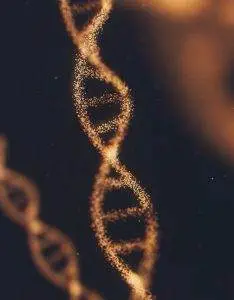
Huntington’s disease is a type of autosomal dominant disorder, which means that a person only needs to inherit one dominant gene from one parent in order to inherit this disorder. If a person has HD, there is a 50% chance that they will pass it on to a child. If a child of a person with HD does not inherit the gene, and therefore does not have HD, then that means they will not pass it on to their children. It is rare, but possible, for a person to be born with a new mutation in the specific gene, and so does not actually inherit HD from a parent.
Because HD typically does not begin to show up until close to middle age, some people who know that they may have the genetic mutation will have genetic testing for Huntington’s disease. This test will tell most people whether or not they will begin to develop Huntington’s symptoms as they age. However, there is a “gray area,” in which a person may have some of the mutated sequencing in their genetic makeup, but not enough to necessarily lead to the development of the disease. These people can still pass on the mutation to their children, and they may have a less severe form of Huntington’s, and/or not develop symptoms until later in life.
Can Acupuncture Help Huntington’s Disease?
Scientific research has been demonstrating more and more that acupuncture can help with many conditions by maintaining the health and connectivity of brain cells and nerve cells. Cells are constantly going through processes of generation and degeneration. The stimulation of certain acupoints has been shown to have a positive effect on these processes, which can be beneficial for people with neurological disorders like HD and Parkinson’s.
Even though we know that Huntington’s and Parkinson’s are specifically related to protein production, we also know that disease is not merely about one small, isolated thing happening in the body. We must take the whole person into account. Stress and many other factors also play a role in how a disease affects each individual. Acupuncture can be a helpful modality that reduces stress in the body and facilitates regeneration and protection of cells.
With TCM, we are able to address the physical, mental, and emotional aspects of Huntington’s disease all at the same time.
Chinese herbs have traditionally been used to help symptoms such as tremors, stiff limbs, muscle weakness, and slow movements. While from the medical point of view these problems are related to the nervous system, in TCM theory we also see them as being related to deficiencies in the kidney Qi, and excess wind. Therefore, herbs that help strengthen the Kidneys and dispel wind may be used in different combinations to treat conditions like Huntington’s disease.
Acupuncture treatment has been shown to help reduce tremors and shaky hands. One study showed that Chinese herbal preparations were effective at helping to reduce involuntary movements. Another study showed that herbs helped with the normal production of proteins and brain cell function.
Neurological Treatment With Acupuncture

Acupuncture and TCM can help with many different kinds of neurodegenerative disorders, whether they are caused by genetics, autoimmune disease, or some other neurological problem.
Neurodegenerative diseases cause the degeneration and death of neurons, or brain cells that communicate with the nervous system. In that sense, Huntington’s disease bears some similarities to other neurodegenerative diseases like:
- Parkinson’s disease
- Alzheimer’s disease
- ALS (Lou Gehrig’s disease)
- Spinal muscular atrophy
- Essential Tremor
- Multiple Sclerosis (MS)
- Bell’s Palsy
- Guillain-Barre syndrome
Many of these conditions can be helped with acupuncture, which is known to help improve the health of the brain, nerves, spinal cord, and the electrical impulses that create connectivity and functionality in the movements of the musculoskeletal system. TCM modalities can also help to relieve stress, improve sleep, boost cognitive function, and regulate mood swings.
Acupuncture Near Me for Huntington’s Disease, Los Angeles Area
Huntington’s disease is a progressive illness, and it becomes harder and harder for a person with HD to communicate what they are feeling. People with Huntington’s may experience both physical and emotional pain. Patients with Huntington’s need a caring team of healthcare providers who can help treat the disease, but also help their emotional and mental health.
At Art of Wellness, we have over 30 years of experience helping people with neurodegenerative disorders feel more comfortable and live the fullest life possible.
*This article is for education from the perspective of Traditional Chinese Medicine only. The education provided by this article is not approved by FDA to diagnose, prevent, treat and cure human diseases. It should not stop you from consulting with your physician for your medical conditions. Traditional Chinese Medicine is based on Qi, which is an invisible force that usually cannot be observed by modern science. Because science focuses on testing ideas about the natural world with evidence obtained through observation, these aspects of acupuncture can’t be studied by science. Therefore acupuncture and Chinese herbs are often not supported by double-blind, randomized trials, and they are considered alternative medicine therapies in the United States.
How to Treat Meningitis With Acupuncture and TCM
By Qineng Tan, L.Ac., Ph.D. & Xiaomei Cai, L.Ac., Ph.D.
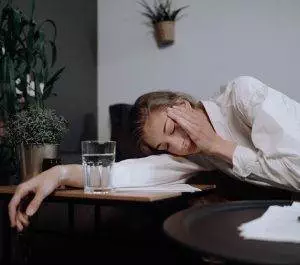
Fever, vomiting, stiff neck, skin rash, aversion to light, bad headache? These are possible early signs of meningitis. Bacterial meningitis can become very serious very quickly—and even be deadly—,so it is important to be aware of meningitis symptoms. Acupuncture and TCM can provide adjunct treatment for meningitis in addition to conventional medicine.
Meningitis is a general term for any kind of swelling or inflammation in the tissue that surrounds the brain and spinal cord. These membranes are called the meninges. Sometimes called “spinal meningitis,” this type of inflammation is most often caused by either a bacterial infection or viral infection, but other things can cause meningitis, too.
The bacteria and viruses that can cause meningitis can be spread from person to person in the same ways as most colds, flus, and other infections. If you suspect you may have bacterial meningitis, it is important to seek treatment right away. Similar to encephalitis (inflammation of the brain), this illness can progress quickly, sometimes causing seizures and even death.
Even after meningitis moves past an acute phase, many people will suffer from after effects and complications of meningitis, like headaches, vision or hearing problems, or cognitive issues. TCM and acupuncture can help people recover more fully from the effects of brain swelling due to meningitis.
Top 5 Types of Meningitis:
Swelling in brain can be caused by meningitis bacteria, or can manifest due to a virus or some other condition. Causes of meningitis can include:
- Bacterial meningitis – meningitis can be triggered by various bacteria, such as the kinds that cause strep throat, pneumonia, tuberculosis, and colds and flu. This type of meningitis can become serious, even causing death if left untreated. Symptoms usually appear quite suddenly, and can worsen in a matter of hours.
- Viral meningitis – Viruses that can cause meningitis include non-polio enteroviruses, herpes virus, West Nile, Epstein-Barr, measles, mumps, and chickenpox/shingles viruses. Typically meningitis caused by these types of viral infection is milder than bacterial meningitis. Certain types of meningitis are also associated with HIV/AIDS.
- Certain types of cancer – if a cancer tumor, such as a brain tumor, or a breast cancer tumor, begin to break apart and move through the body, they can get into the meninges and cause carcinomatous meningitis.
- Lupus – sometimes meningitis can be part of an autoimmune response that affects the central nervous system, such as occurs with Lupus.
- Injury to the head or spine, brain surgery – swelling around the brain can be caused by some kind of external physical trauma
Meningitis can also be caused by a fungus or parasite that gets into the body.
The effects of meningitis, especially bacterial meningitis, can be very serious, so if you see a combination of symptoms from those listed below, you should seek urgent medical attention.
Top 10 Meningitis Symptoms:

Brain swelling symptoms or symptoms for meningitis can include:
- Fever
- Nausea and/or vomiting
- Stiff neck, neck stiffness
- Severe headache
- Meningitis rash on any part of the body: small red spots, red blotches, blood blisters
- Aversion to bright light
- Fatigue, sleepy, hard to stay awake
- Confusion, delirious, foggy head, difficulty concentrating
- Seizures
- No appetite or thirst
In infants and young children, signs of meningitis might include: crying, not wanting to eat, hard to wake up, high fever, stiffness in the body, swelling or bulging on the top of the head (fontanel).
There are a few types of meningitis vaccine, or meningococcal vaccine, which can help to prevent bacterial meningitis.
Diagnosis and Treatment for Meningitis
When a patient presents with these types of symptoms, a doctor will probably want to err on the side of caution and test for bacterial meningitis, since time is of the essence when treating what could be a very serious condition.

Blood tests, CT scan, or MRI may all be used to check for signs, but a spinal tap to collect cerebrospinal fluid is considered the definitive way to confirm a diagnosis of bacterial meningitis.
Bacterial meningitis is treated with antibiotics and corticosteroid medications to get rid of the bacterial infection and reduce swelling.
Viral meningitis will not respond to antibiotics. Some doctors may prescribe steroid medications to reduce swelling.
It can take longer to figure out what is causing swelling in the brain if it is caused by some other factor, such as a fungal infection, or in relation to an autoimmune disorder. In some cases, a doctor may choose to start treating with antibiotics and/or antivirals until the root cause is determined.
Even after meningitis treatment, some people will continue to have after effects, some of which can even lead to disability. Cognitive problems with memory and concentration, vision problems, headaches, tinnitus (ringing in the ears), dizziness, problems with balance and coordination, and even seizures, can be some of the long-term effects of meningitis. Acupuncture and TCM can be very helpful for treating these lingering symptoms of meningitis.
Can Acupuncture Help Meningitis?
In Traditional Chinese medicine, we classify many infectious diseases—including cold and flu, strep throat, chicken pox, SARS, tuberculosis, and meningitis—as “warm” diseases. When these types of external pathogens get into the body, they cause fever, which depletes the Yin (cool, liquid) energy of the body. The TCM approach, then, is primarily to clear the heat.
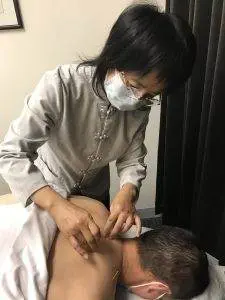
TCM has its own way of looking at symptoms occurring in a pattern, from which we deduce what kind of pathogenic forces are creating disharmony. The TCM view of meningitis is that it relates to an invasion of Heat that leads to a deficiency of Yin energy. A pattern of symptoms that includes: fever, red skin rash, irritability, confusion, and trouble sleeping would indicate that pathogenic heat is depleting the body of fluids and affecting the pericardium, which in TCM means “protector of the heart.”
When these symptoms are present, we know that there is inflammation causing swelling of tissues and preventing the smooth flow of nutrition and Qi to the vital organs. Chinese herbs and acupuncture can help reduce inflammation that causes symptoms of meningitis.
Chinese herbal formulations that go back centuries can also have antibacterial and antiviral effects.
Acupuncture treatment can not only help, then, the root cause of meningitis, but can also deal with the symptoms many people experience as a result of swelling in the brain, such as headaches, dizziness, and spasms.
Acupuncture Near Me for Meningitis – Los Angeles Area
Meningitis is a condition that needs urgent care because it can be a very serious illness in the short-term. Meningitis can also lead to long-term effects that are debilitating. Acupuncture and TCM can provide relief and recovery from meningitis symptoms.
*This article is for education from the perspective of Traditional Chinese Medicine only. The education provided by this article is not approved by FDA to diagnose, prevent, treat and cure human diseases. It should not stop you from consulting with your physician for your medical conditions. Traditional Chinese Medicine is based on Qi, which is an invisible force that usually cannot be observed by modern science. Because science focuses on testing ideas about the natural world with evidence obtained through observation, these aspects of acupuncture can’t be studied by science. Therefore acupuncture and Chinese herbs are often not supported by double-blind, randomized trials, and they are considered alternative medicine therapies in the United States.
How to Treat a Sore Throat With Acupuncture and TCM
By Qineng Tan, L.Ac., Ph.D. & Xiaomei Cai, L.Ac., Ph.D.

Scratchy throat? Dry throat? Painful Swallowing? A sore throat is often the first sign of a cold, but it can be hard to tell if a swollen throat is caused by a throat infection, a virus, bacterial infections like strep throat, allergies, or something else. Acupuncture and TCM Chinese herbs can provide excellent sore throat remedies to bring quick pain relief.
Throat pain, throat irritation, or trouble swallowing due to soreness is known as “pharyngitis.” The most common sore throat causes are viral infections, or cold and flu. This type of sore throat will usually go away once the infection runs its course.
The bacterial infection known commonly as “strep throat,” caused by streptococcus bacteria (throat strep), is another common cause of sore throat, usually accompanied by fever, swollen tonsils and lymph nodes, and red spots in the mouth.
But there are many possible causes of a sore throat, including:
- Common Cold – along with a runny nose, sneezing, and cough, a sore throat is one of the common cold symptoms.
- Flu – a sore throat with fever and chills or body aches may be a sign of flu.
- COVID-19 virus – many people are experiencing a sore throat as one of the early symptoms of the latest variant. This scratchy throat can last a long time.
- Mononucleosis – the Epstein Barr virus, also known as “mono,” can cause a sore throat, swollen lymph nodes, fatigue, and sometimes a skin rash.
- Chickenpox or measles – these illnesses often start off with a mild fever and sore throat; then, the rash or skin sores appear a few days later.
- Allergies – an allergy to pollen or other particles in the air may cause dryness in the throat. Postnasal drip can also create more irritation from constant throat-clearing.
- Dryness – when the weather is very dry—as it is here in California, sometimes—a stuffy nose during the night can lead to sleeping with your mouth open. Breathing dry air through your mouth can cause you to wake up with a sore, scratchy throat.
- Vocal strain – shouting and screaming at a concert, or overusing your voice with talking or singing can lead to throat pain and the need for vocal rest.
- GERD – Acid reflux can damage the tissues of the throat, causing difficulty swallowing, a hoarse-sounding voice, and chronic pharyngitis.
- Sleep Apnea – snoring can cause a dry mouth and sore throat.
Sore Throat Treatment
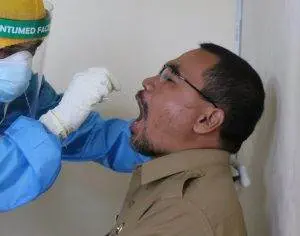
A doctor will typically perform a swab test or throat culture to check if a person has strep throat or a staph infection. If so, antibiotics are usually prescribed to treat the bacterial infection. But antibiotics will not help a sore throat that is due to a viral infection. Most people will take pain relievers or sore throat medicine to help relieve throat pain, or suck on throat lozenges.
People who suffer from burning chest pain and sore throat from GERD will often use over-the-counter antacid tablets to help with scratchy throat.
Most people just wait out a sore throat, hoping it will get better within a few days and not turn into chronic pharyngitis. Acupuncture and other TCM treatments can help reduce the time it takes to get over a sore throat and related illness.
Can Acupuncture Help a Sore Throat?

TCM methods have been used to treat upper respiratory infections, or the common cold, for thousands of years. According to TCM theory, “heat” is a pathogenic force that encompasses conditions of too much heat and dryness in the body. This excess heat can come from both external factors and internal factors. There may be a yin deficiency, meaning that there is not enough yin energy to cool down the body.
People are more prone to developing heat imbalances during the winter months because they tend to spend more time indoors with the heat on, eat more warm foods, and get less exercise. Too much heat builds up in the body, and this leads to inflammation, dryness, and sometimes itchy skin and rashes.
Acupuncture treatment can help reduce inflammation and provide analgesic pain relief of a sore throat. One study showed that people treated with auricular acupuncture for sore throat reported less pain, both 15 minutes after treatment, and six hours later. Acupuncture can also work to help clear heat from the organ systems of the body, clear phlegm from the lungs and upper respiratory tract, and to strengthen the Wei Qi, or defensive Qi.
Chinese herbs will also be instrumental in helping to clear up a sore throat. There are many varieties of herbal formulae that work in different synergistic ways to alleviate a sore throat, depending on the other related symptoms and whether or not there is some type of infection present. An acupuncture practitioner will be able to customize a formula for each individual patient, but there are many tried-and-true Chinese herb preparations that work well for colds and sore throats in many cases.

Yin-Qiao, an herbal formulation composed of several Chinese herbs, is a very popular remedy for the common cold and works very well to shorten the duration of a cold, especially if taken right at the first sign of a sore throat. Yin-Qiao has been shown to work on many levels, as an antiviral, anti-bacterial, and an anti-inflammatory, as well as helping to strengthen immunity.
A sore throat is a sign that you should rest your voice, get extra sleep, and consume plenty of liquids. We recommend sipping on warm water, on its own or with lemon or ginger, or an herbal tea such as mint. Eat more cooling foods, such as: apples, pears, especially Asian pears, radishes, cucumbers. These will help dispel heat.
Acupuncture for Sore Throat Near Me in West Los Angeles
While often a sore throat is simply a symptom of a mild cold, it is also a clear signal that there is some kind of infection or other imbalance present. It is wise to pay attention and do everything you can to boost your immune system as soon as you notice that scratchy throat sensation. An acupuncture treatment and herbs can go a long way towards helping make sure that a sore throat doesn’t turn into something more serious.
*This article is for education from the perspective of Traditional Chinese Medicine only. The education provided by this article is not approved by FDA to diagnose, prevent, treat and cure human diseases. It should not stop you from consulting with your physician for your medical conditions. Traditional Chinese Medicine is based on Qi, which is an invisible force that usually cannot be observed by modern science. Because science focuses on testing ideas about the natural world with evidence obtained through observation, these aspects of acupuncture can’t be studied by science. Therefore acupuncture and Chinese herbs are often not supported by double-blind, randomized trials, and they are considered alternative medicine therapies in the United States.